It’s 5 a.m. You’re poolside, coffee in hand, wondering how to be a good swim parent.
Supporting a swimmer takes more than just showing up. It means learning, adjusting, and staying steady through wins and wipeouts. As a former competitive swimmer and now a dedicated swim mom, I’ve lived both sides of the lane line.
From early mornings to emotional meets, I’ve learned what really matters. This post shares the unspoken rules of poolside parenting—so you can feel confident, capable, and connected. Let’s dive into how to be a good swim parent, no stopwatch required.
The Swim Parent’s Code: Unspoken Rules for Poolside Behavior
Being a swim parent means walking a fine line—cheering loud but not too loud, stepping in but not overstepping. It’s knowing when to offer advice and when to just hand over the towel. While there’s no official rulebook, there is a rhythm to it all.
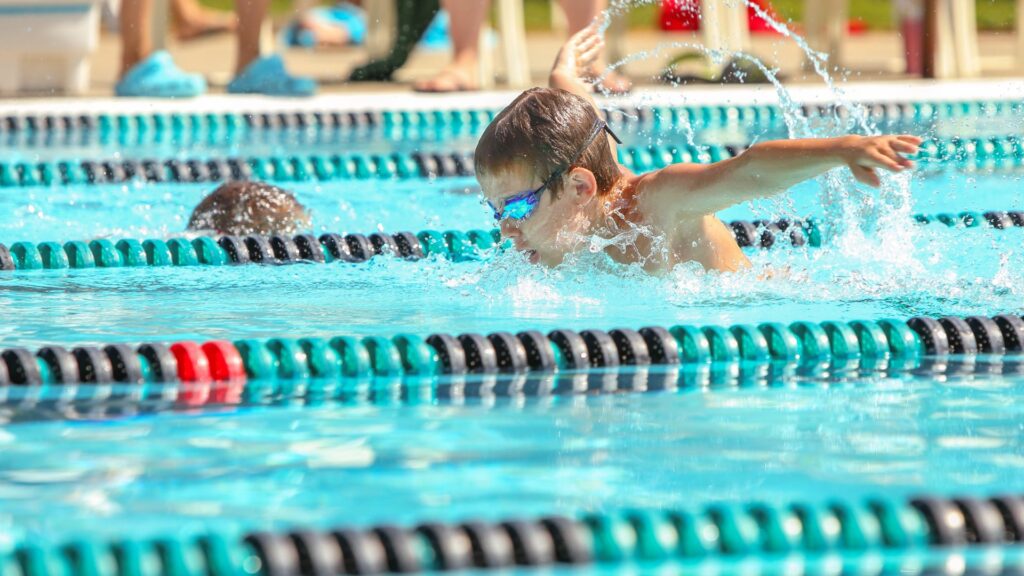
And once you learn it, you’ll feel less overwhelmed and more like the steady support your swimmer needs—whether they’re chasing a PR or just learning to love the sport.
What Being a Good Swim Parent Really Means (It’s Not Just Cheering)
Learning how to be a good swim parent starts with realizing this role goes way beyond the bleachers. You’re not just there to clap and time split sheets. Being part of the team means showing up—even if you never get in the water.
You’re More Than a Cheerleader
You’re the early alarm, the meal planner, the voice of calm on race day.
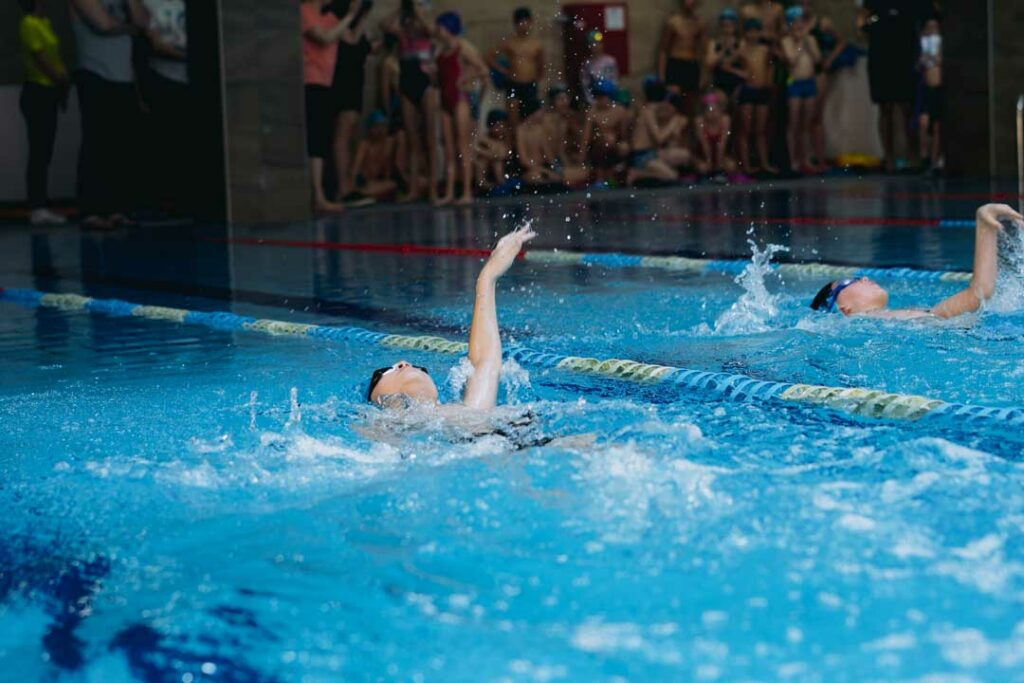
Good swim parenting means helping with the mental, physical, and emotional load of the sport. You track schedules, pack gear, and drive to 6 a.m. practices—usually without complaint.
But you’re also a coach’s partner. Respect their role, but stay engaged. Ask questions. Stay informed. Swim parents who understand the sport are better prepared to support their swimmer’s growth, both in and out of the pool.
Every Swimmer Is Different
Some kids need high fives and pep talks. Others just want space and a quiet ride home. To be a good swim parent, you have to tune in to your swimmer’s style.
Pay attention to how they respond to stress, praise, and feedback. Let their personality guide your support. While one swimmer might thrive on competition, another might need reminders that fun still matters.
There’s no one-size-fits-all approach—but your swimmer will show you what works if you’re willing to listen.
The Emotional Ups and Downs Are Real
Swim parenting isn’t all personal bests and podium photos. It’s also tears in the car, missed goals, and months with no progress.
You’ll feel every missed turn and slow finish. And that’s okay.
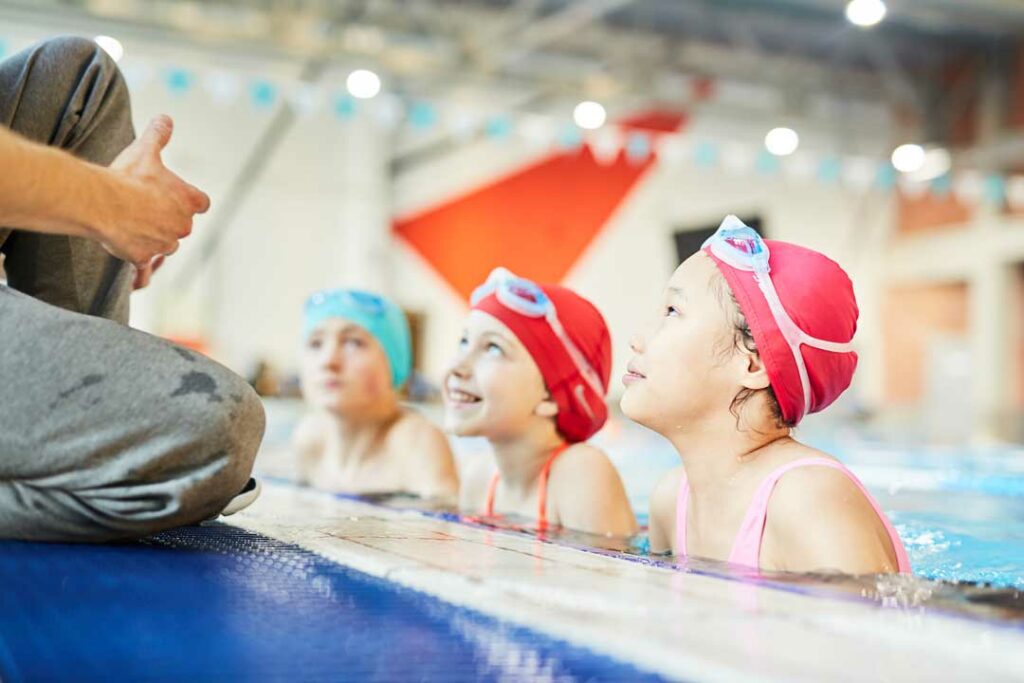
The key is staying steady. Be the anchor—not the storm. Let them vent. Remind them that one bad swim doesn’t define them. Celebrate grit, not just gold.
By modeling emotional balance, you teach them resilience—one of the best lessons any youth athlete can learn.
Still wondering how to be a good swim parent? It’s about showing up consistently, not perfectly.
Offer support, not pressure. Learn enough about the sport to connect, but don’t try to control it. Let your swimmer lead, and be ready to walk beside them through both cheers and tears.
That’s what good swim parenting really looks like.
Swim Meet Etiquette: Bleacher Rules Every Good Swim Parent Should Know
Swim meets are long, unpredictable, and emotionally charged. They test your patience, your perspective, and sometimes your ability to find a clean bathroom. But they also offer a front-row seat to your swimmer’s growth. Knowing how to be a good swim parent starts with how you show up on the pool deck.
Respect the Officials and Volunteers
They are the reason the meet can happen. That timer who missed your child’s touch? They’re unpaid.
That official who called the DQ? Likely trained and experienced—and not out to sabotage your swimmer.
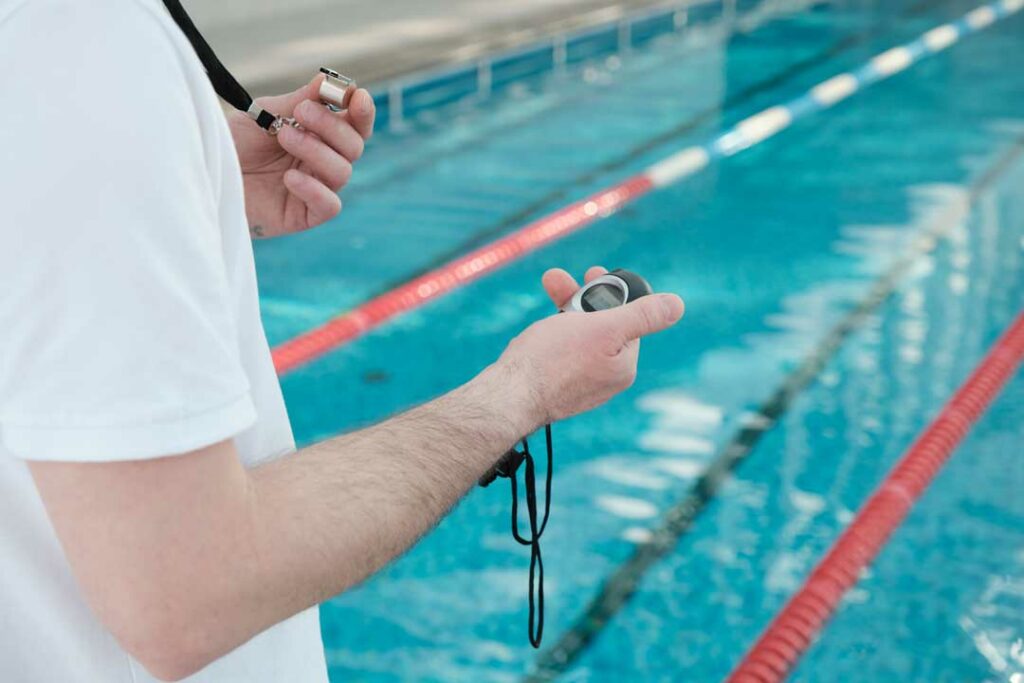
Stay respectful, even when the call doesn’t go your way. Your swimmer sees how you react.
Coaches Have a Job—Let Them Do It
Standing behind the blocks, trying to catch the coach’s eye or sneak in one last piece of advice, doesn’t help. It distracts. The coach knows your swimmer’s strengths, struggles, and race plan. Trust that relationship. Your job is to support it, not override it.
Cheering is Welcome—Coaching is Not
There’s a line between encouragement and interference. Yelling mid-race instructions like “kick harder” or “breathe less” crosses it. Swimmers need focus, not noise. Let them hear your voice after the race, not during. Focus on connection, not control.
Celebrate More Than Time
The clock doesn’t tell the full story. Maybe your swimmer tried a new strategy, overcame nerves, or swam up an age group. Recognize those wins. Focusing only on PRs sends the message that time is all that matters. Growth, effort, and resilience deserve equal attention.
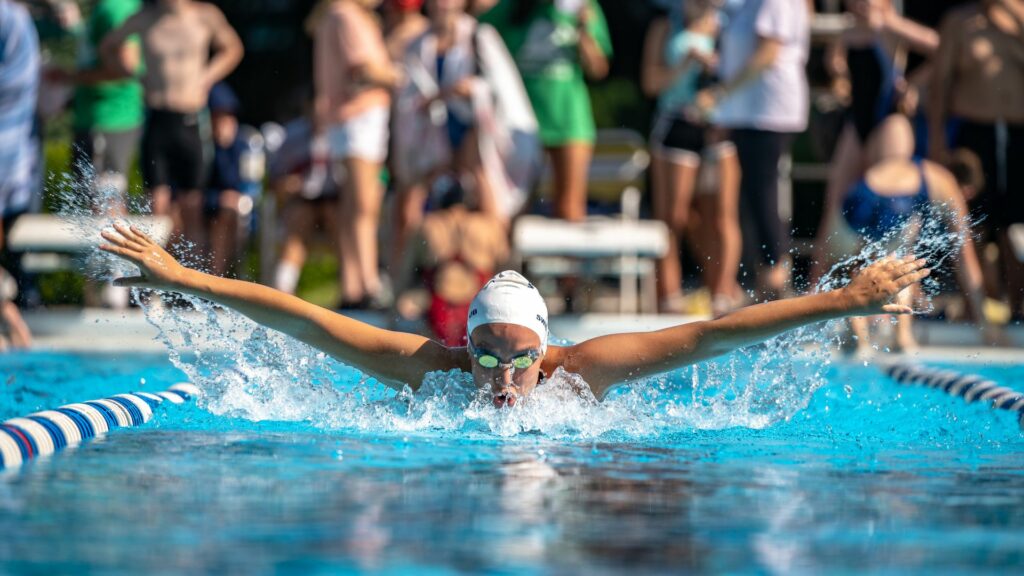
Don’t Compare, Don’t Brag
Bleacher talk can turn toxic fast. Sharing your swimmer’s best times uninvited or one-upping another parent isn’t helpful. Every swimmer progresses differently. That 12-year-old who just dropped six seconds may have been stuck for a year. Stay in your lane, literally and figuratively.
Prepare for the Chaos
Meets rarely run on time. Heats shift. Warmups get crowded. Your swimmer might have hours between events—or none. Bring snacks, layers, sharpies, and patience. A prepared parent reduces stress for everyone. Still, expect things to go off script. Stay calm when they do.
How to be a good swim parent at a meet has little to do with how loud you cheer or how much you know. It’s about your presence—steady, informed, and encouraging. Swim meets aren’t just tests for swimmers. They test us too. And the more we understand the unspoken rules, the better we can support the athletes we love.
Emotional Support: How to Be a Good Swim Parent Through It All
Competitive swimming is more than just early mornings and time drops. It’s an emotional journey—for both swimmers and parents. If you want to understand how to be a good swim parent, emotional support is where it counts most. And it’s not always the loudest cheers that matter.
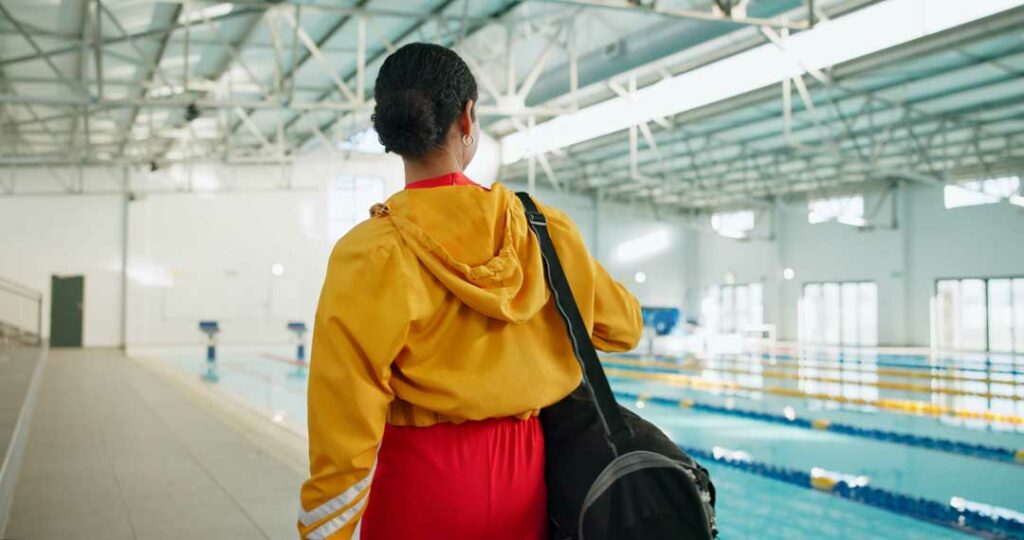
Before the Race: Nerves Are Normal
Every swimmer, no matter how experienced, deals with pre-race nerves. You can’t erase that anxiety, but you can help manage it. Start by listening. Don’t overload them with advice or strategy unless they ask for it. A calm ride to the pool and a quiet “you’ve got this” can go further than a pre-race pep talk.
You can also help them focus by keeping things simple. Offer to review the heat sheet or clarify the swim lingo if they’re unsure about an event. Even seasoned swimmers sometimes need reassurance about the basics.
After the Race: Be Steady, Not Reactive
The result doesn’t change your role. Whether they won their heat, missed a best time, or got disqualified, your job is the same—stay steady. Resist the urge to analyze or fix it in the moment. Let your swimmer decompress. Then, when they’re ready, ask how they felt rather than what they swam.
Validation matters. So does timing. A good swim parent knows when to talk—and when to just hand over the towel.
At Home: Keep the Conversation Safe
Outside the pool, your swimmer needs space to reflect. Not every struggle shows up in the splits.
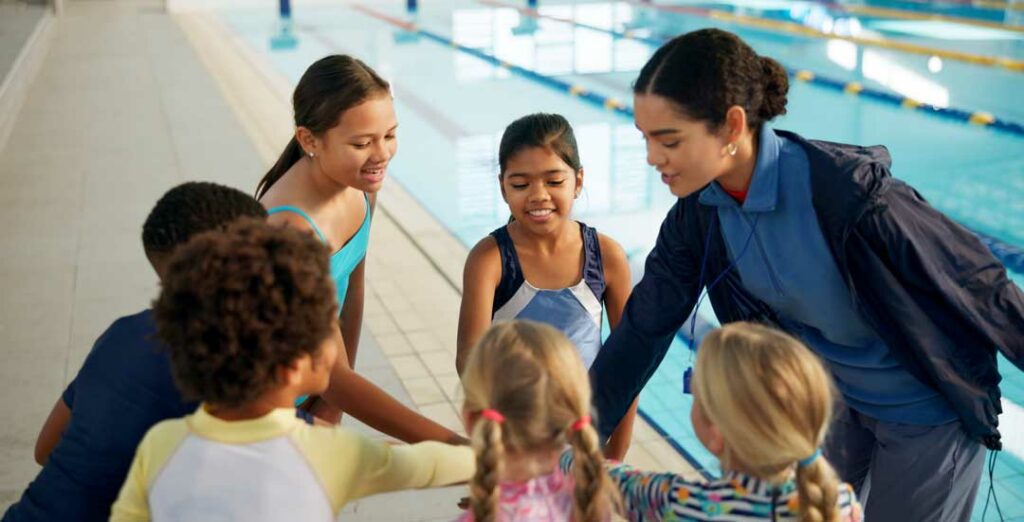
Maybe it’s friendship drama, coach feedback, or burnout they’re afraid to name. Create an environment where it’s okay to say, “I’m frustrated,” or “I need a break.”
Ask open-ended questions. Show curiosity, not judgment. Growth happens when kids know their feelings are safe with you.
For You: Find Your Own Support Too
Let’s be honest—this sport asks a lot of us. The early mornings, the emotional investment, the financial strain—it adds up. You need your own outlet, too.
Connect with other swim parents who get it. Share frustrations, celebrate milestones, and laugh about soggy towels and endless goggles. When you feel supported, you’re better able to support your swimmer.
Being a good swim parent doesn’t mean always having the right words. It means showing up with empathy, listening without fixing, and cheering in ways that feel safe and steady. The emotional lane is just as important as the physical one—and it’s where your presence can make the biggest difference.
The Swim Parent’s Toolkit: What Every Swim Family Needs
Knowing how to be a good swim parent isn’t just about attitude—it’s also about preparation. Swim meets and practices move fast, run long, and test your stamina almost as much as your swimmer’s. The right tools can turn a stressful day into a smooth one. Here’s what every swim parent should have on deck.
Pack the Poolside Essentials
Comfort matters. Bleachers get hard. Meets get long.
Don’t forget snacks and water. A hungry swimmer is a distracted swimmer. And honestly, so is a hungry parent.
Get Organized and Stay Ahead
Swim families juggle a lot—practice times, meet entries, team emails, and gear checklists.
Use calendar apps to stay on top of it all. Set alerts for warm-up times and deadlines.
Keep a designated swim bag stocked and ready so nothing gets forgotten at 5 a.m. When everything has a place, mornings feel a little less frantic.
Plan for Nutrition and Hydration
Good swim days start with smart fuel. Pack protein-rich snacks, simple carbs, and plenty of fluids.
Avoid heavy meals between events, but keep healthy options within reach. Even if your swimmer insists they’re not hungry, they’ll thank you when they crash later. A good swim parent anticipates the crash and preps for it.
Bookmark Resources That Help
Being prepared also means knowing where to find answers fast. Download the Meet Mobile app to track heats, lane assignments, and live results. Use MySwim.io to monitor your swimmer’s progress, compare times, and follow rankings over the season.
Save links to your team portal, your swimmer’s USA Swimming profile, and any team-specific apps your coach recommends.
Don’t be afraid to ask questions, either. Experienced swim parents are often your best resource—and usually happy to help a newcomer navigate the chaos.
From Cheers to Tears and Everything in Between
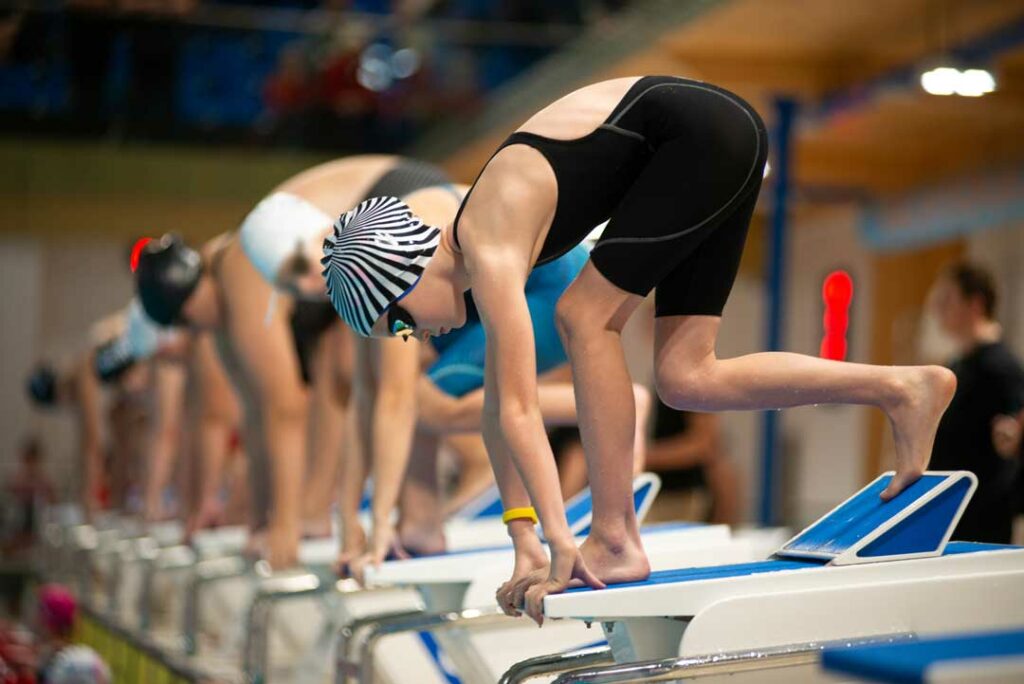
Being a swim parent isn’t a one-season job. It’s a long-haul commitment, full of early mornings, wet towels, emotional highs, and the occasional tear-filled car ride. Learning how to be a good swim parent takes time, patience, and more than a few mistakes along the way.
But here’s the truth: You’re doing better than you think. Just by showing up, asking questions, and trying to support your swimmer, you’re making a difference. The unwritten rules—the quiet claps, the packed snacks, the held-back advice—they matter more than you realize.
So keep learning. Keep listening. And keep showing up, even on the hard days. This sport doesn’t come with a manual, but it does come with a community—and you’re a part of it now.
What’s your favorite poolside parenting tip? Drop it in the comments and help another swim parent stay afloat.
FAQs
A good swim parent supports without pushing, listens without judging, and focuses on effort more than outcome.
Bleacher cushion, snacks, water, sharpies, warm layers, a good attitude, and lots of patience.
Let the coach handle the training. Offer encouragement, not critique. Ask how they felt before asking how they swam.
Go for easy-to-digest foods like bananas, granola bars, PB&Js, trail mix, or electrolyte drinks. Avoid heavy or greasy snacks.
Breathe. Stay calm for your swimmer’s sake. Avoid over-talking before races. Trust their training and focus on support, not control.

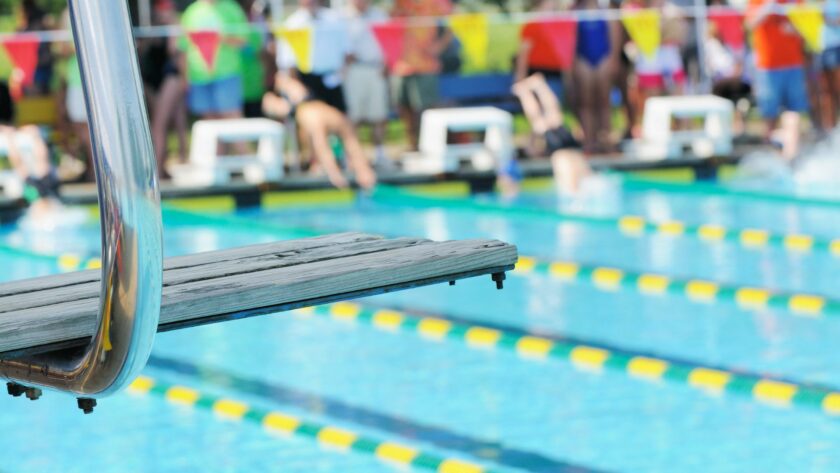





[…] As a swim mom, I know how hard it is to watch your child miss out on the sport they love. We want to protect their passion, not pause it. That’s why swimmer injury prevention isn’t just a checklist—it’s part of being a good swim parent. […]